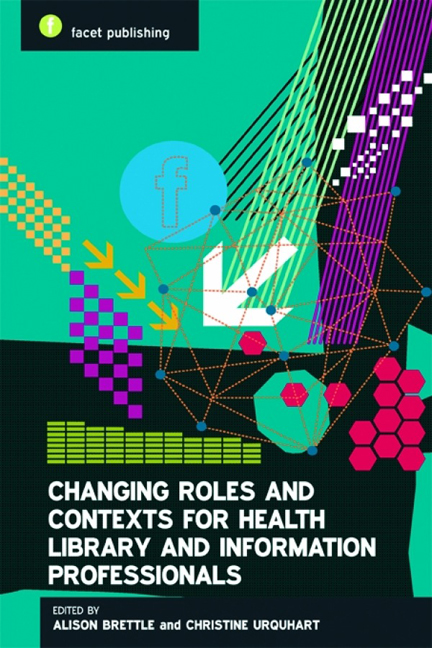Book contents
- Frontmatter
- Contents
- About the editors
- List of contributors
- Overview
- Part 1 Context
- Part 2 Roles
- 5 Skills, competencies and knowledge
- 6 The librarian as information provider and educator
- 7 The librarian who analyses information and manages knowledge
- 8 The librarian within research and evidence-based practice
- 9 The librarian as decision maker
- Conclusion
- Index
7 - The librarian who analyses information and manages knowledge
from Part 2 - Roles
Published online by Cambridge University Press: 08 June 2018
- Frontmatter
- Contents
- About the editors
- List of contributors
- Overview
- Part 1 Context
- Part 2 Roles
- 5 Skills, competencies and knowledge
- 6 The librarian as information provider and educator
- 7 The librarian who analyses information and manages knowledge
- 8 The librarian within research and evidence-based practice
- 9 The librarian as decision maker
- Conclusion
- Index
Summary
Introduction
Trying to provide a brief introduction to knowledge management, as perceived and practised in the health sector, is a challenge when there are so many books and articles on knowledge management. The computer scientist, the human resources manager, the information manager, staff development and the librarian – all have their perspective on knowledge management and what it should involve. The type of organization also affects the perspective on knowledge management, as an engineering organization or projects run by agencies such as the World Bank may emphasize the know-how, and the ‘war stories’ that staff relate to help newcomers appreciate how things are done in this organization and why. Storytelling, as it is explained by management thinkers such as Stephen Denning at the World Bank (Denning, 2000), seems very far removed from knowledge transfer and getting evidence into practice in a health service organization. Storytelling – is not that all about anecdotal evidence? That is very low down in the hierarchy of evidence for health service staff, surely. But what about the way many students are taught these days – problem-based learning, around a realistic clinical scenario or story? Clinical journals may have sections for care studies, case reports, as well as reports of research trials, and clinical decision making may be fast as it depends on scripts, outline storylines that professionals remember more easily (Urquhart, 1998).
The structures and systems that information professionals design to support better information management and knowledge management for health care staff need to reflect how people learn, particularly in the workplace. A long-term problem for many health staff is that the systems they use for patient administration just serve current needs, and although it is of course important to ensure that the record systems used are accurate and the record reflects the care provided, it is often difficult to see how the information in the patient record can be used to improve practice (Urquhart et al., 2009). Clinical audit is one step forward, and Helen Seeley (in her case study in Chapter 8) explains how her role spans clinical audit and research support.
- Type
- Chapter
- Information
- Publisher: FacetPrint publication year: 2011



